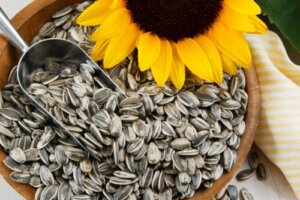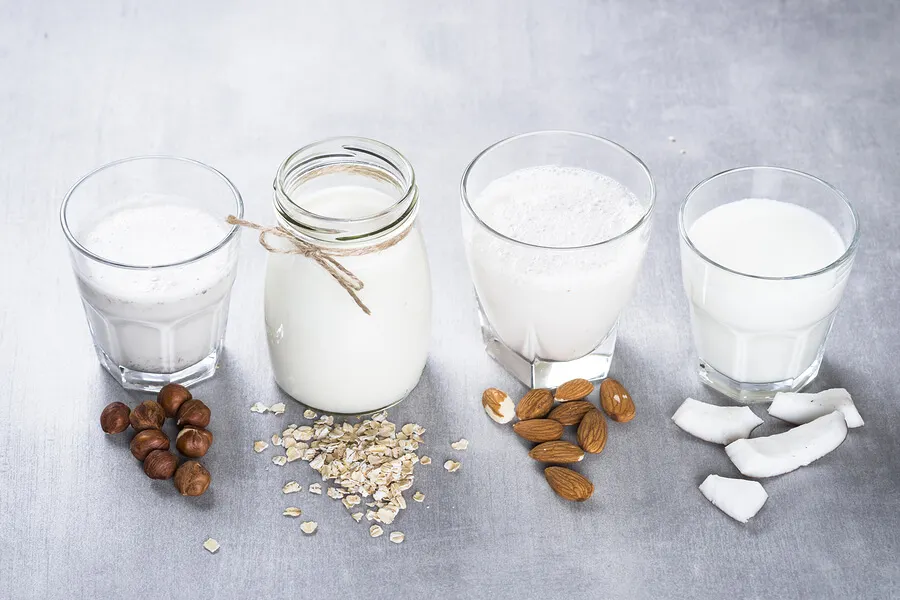Sunflower Seed Milk: Benefits and Preparation


Written and verified by the nutritionist Saúl Sánchez Arias
Sunflower seed milk can bring many positive health benefits. It can be used as a replacement for some vegetable beverages, such as soybean, oat, or almond milk.
It’s made by pressing the seeds and then extracting the liquid they give off. In addition, it’s found more and more frequently in supermarkets, and is an option to consider.
Before we begin, we must point out that vegetable drinks shouldn’t be used as a substitute for dairy products. They can be a complementary food, but those made from cow’s milk have a much higher nutritional density.
However, in people who have allergies to whey proteins, then it can be used as a substitute.
The benefits of sunflower seed milk
The vitamin E content of sunflower milk should be highlighted. We’re talking about a nutrient with a high antioxidant power, as evidenced by research published in the journal IUBMB Life.
It can neutralize the formation of free radicals and their subsequent accumulation in the body’s tissues. This effect is linked to a better state of health and a lower incidence of chronic and complex pathologies.
It should also be noted that sunflower seeds provide a significant amount of heart-healthy fatty acids, especially of the unsaturated type. These have been shown to improve heart function and help prevent atherosclerosis. This disease is one of the main risk factors for heart attacks and strokes.
Furthermore, the concentration of magnesium and phosphorus in sunflower seed milk is very beneficial. Specifically, magnesium is a determining mineral in the physiology of rest, according to a study published in the journal Nutrients. Maintaining its levels in adequate levels can prevent sleep-related disorders.
Find out more here: Four Recipes for the Main Types of Vegetable Milk
How to make it at home?
It’s relatively easy to make sunflower seed milk at home. To do so, you need a cup of peeled, raw seeds and a couple of cups of water.
Put some water in a saucepan and add the seeds, leaving them to soak for at least 3 hours. After this time, drain them well and place them in a blender.
Then just add the 2 cups of water and blend everything well until you obtain a homogeneous mixture. To finish, it will only be necessary to strain the drink, preventing possible impurities.
You can then divide it into glass jars that can be perfectly closed and kept refrigerated. It can withstand several days without major problems.
If you opt for a commercial sunflower seed drink, the best thing to do is to check the label to make sure that it doesn’t contain added sugars. Many of these products of vegetable origin contain too many simple carbohydrates, which could affect your health.
Sunflower seed milk can also provide a good dose of protein, albeit of low biological value. Even so, they will serve as a complement to reach the daily requirements of these nutrients and maintain good muscular health. Otherwise, sarcopenia could appear prematurely.

You may also be interested in: The Properties and Benefits of Oat Milk
Sunflower seed milk: a liquid with plenty of nutrients
Sunflower seed milk provides plenty of nutrients and calories. Although it isn’t an optimal substitute for cow’s milk, it can be a good liquid to include in the diet, especially in the case of hypercaloric patterns that aim to promote muscle mass gain. To ensure this, it will also be decisive to optimize the protein intake.
Don’t forget that the best tool to ensure a good state of hydration is natural mineral water. Under no circumstances should it be replaced by soft drinks or other liquids containing added sugars. Cow’s milk or vegetable drinks can be present in a controlled manner in the diet. The key is variety and balance.
All cited sources were thoroughly reviewed by our team to ensure their quality, reliability, currency, and validity. The bibliography of this article was considered reliable and of academic or scientific accuracy.
- Miyazawa T, Burdeos GC, Itaya M, Nakagawa K, Miyazawa T. Vitamin E: Regulatory Redox Interactions. IUBMB Life. 2019;71(4):430-441. doi:10.1002/iub.2008
- Sacks FM, Lichtenstein AH, Wu JHY, et al. Dietary Fats and Cardiovascular Disease: A Presidential Advisory From the American Heart Association [published correction appears in Circulation. 2017 Sep 5;136(10 ):e195]. Circulation. 2017;136(3):e1-e23. doi:10.1161/CIR.0000000000000510
- Cao Y, Zhen S, Taylor AW, Appleton S, Atlantis E, Shi Z. Magnesium Intake and Sleep Disorder Symptoms: Findings from the Jiangsu Nutrition Study of Chinese Adults at Five-Year Follow-Up. Nutrients. 2018;10(10):1354. Published 2018 Sep 21. doi:10.3390/nu10101354
This text is provided for informational purposes only and does not replace consultation with a professional. If in doubt, consult your specialist.








